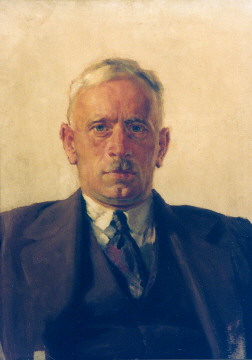It is difficult to name another scholar in the Second Republic with such a wide range of interests and research achievements, who was at the same time an active politician and ideologist of the party he represented. Rybarski is one of the leading figures in the history of Polish economics. A political activist of the National Party, Member of the Sejm, supporter of the parliamentary system and adherence to the rule of law, also in economic terms.
Roman Rybarski was born on 3 August 1887 in Zator in the Austrian partition. Already during his studies at the Faculty of Law at the Jagiellonian University, he became involved with the Polish national movement. He became involved in the activities of the secret pro-independence youth organisation “Zet”, and then of the National League. After Poland regained independence, he was a close associate of Władysław Grabski, the reformer of Polish finances. He took part in the preparations for the launch of the Bank of Poland. Rybarski was a professor at the Jagiellonian University, then at the Warsaw University of Technology, and from 1924 headed the Treasury Department at the Faculty of Law at Warsaw University. In the years 1928-1935, he was a Member of the Sejm of the Republic of Poland, later an activist with the Camp of the Great Poland and the National Party. As an economist and author of nearly 30 books, Rybarski was involved in theoretical economics, economic policy and economic history.
After the Third Reich and the Soviet Union attacked Poland, he remained in Warsaw. He took part in the creation of the political authorities of the Polish Underground State (he was director of the Treasury Department) and co-founded the Faculty of Law of the secret University of Warsaw. In May 1941, he was arrested and taken to the Pawiak prison, and deported to Auschwitz on 24 July. The National Party, as a party with an anti-German programme, was particularly persecuted and destroyed by the German occupiers. Already at the turn of 1940 and 1941, as a result of arrests, the Germans disorganised the structures of the SN in Wielkopolska and Pomerania, inflicted heavy losses in the districts of Łódź, Kalisz, Zagłębie Dąbrowskie and the Warsaw headquarters. Apart from Rybarski, most members of the party’s supreme authorities were arrested; they died in Auschwitz or were shot in Palmiry. Under Soviet occupation, the situation was similar – the mere suspicion of links with the pre-war National Democracy risked arrest, a death sentence or deportation to a gulag, and deportation deep into the USSR for the family.
In Auschwitz, Rybarski became involved, as did other representatives of national organisations (including Jan Mosdorf of the National-Radical Camp), in the camp’s conspiratorial structures, created by Captain Witold Pilecki, and in the process of unifying the Polish political and military conspiracy in the camp.
He died in the camp on 6 March 1942.





